Sparta depth study key terms from Bradley chapter + class notes
0.0(0)
Card Sorting
1/101
Earn XP
Description and Tags
OCR a level ancient history depth study sparta 478-404 BCE
Last updated 12:22 PM on 6/25/23
Name | Mastery | Learn | Test | Matching | Spaced | Call with Kai |
|---|
No analytics yet
Send a link to your students to track their progress
102 Terms
1
New cards
Pausanias
(Not the general) \~1st century CE traveller and writer who portrays a utopian view of Sparta
2
New cards
Tyrtaeus
Near-contemporary 7th cent BCE, Ionian, patriotic poet, lived through the second Messenian war, work only survived in fragments
3
New cards
Alcman
Helpful poet for this period from Lydia in Persia
4
New cards
Terpander
Helpful poet for this period from Lesbos
5
New cards
Herodotus
5th cent BCE historian, largely unhelpful but sometimes comments on Sparta in terms of how they were involved in Greece’s success in the Persian Wars
6
New cards
Thucydides
5th cent BCE disgraced Athenian general and historian, recorded some valuable information about Sparta’s involvement in the Peloponnesian Wars
7
New cards
Xenophon
4th cent BCE historian, influenced by living on an estate given to him by a King in the Peloponnese for two decades when exiled from Athens; best informed non-Sparta, but also an open laconophile and defensive of Sparta
8
New cards
Plato
4th cent BCE political writer, idealises the Spartan constitution and is even considered by modern scholarship to be responsible for the rise of the myth of Sparta
9
New cards
Aristotle
4th cent BCE political writer, who criticised the Spartan system and constitution with reference to his own political philosophies, lived through Sparta’s decline, fragmentary, misogynistic
10
New cards
Plutarch 46-120 CE
2nd cent CE biographer, wrote ‘Life of Lycurgus’ BUT this was: (a) influenced by two later 3rd cent CE Spartan kings and (b) he himself isn’t certain about any details of his life due to conflicting accounts over time
11
New cards
Beginning of Plutarch’s ‘Life of Lycurgus’
“scarcely anything asserted by \[historians’ accounts on Lycurgus\] which is not called into question or contradicted by the rest“
12
New cards
Lycurgus
The lawgiver supposedly responsible for: the Spartan social code, military and land system, and political constitution, of whose existence we are unsure (Plutarch cannot be relied upon, other ancient sources give us nothing)
13
New cards
Spartan development before the 9th cent BCE
11th cent BCE Dorian presence was evident in Laconia, four adjacent villages are founded on the West Bank of the Eurotas River
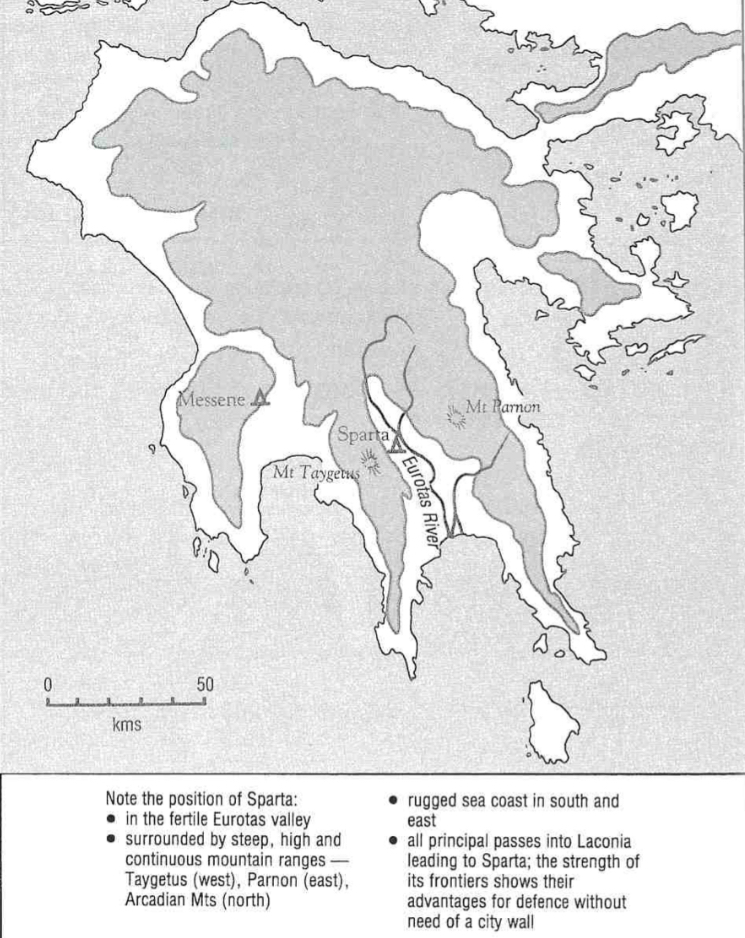
14
New cards
Spartan development during the 9th cent BCE
These villages amalgamate ‘synoecism’ into the single city of Sparta and develops the dual kingship system
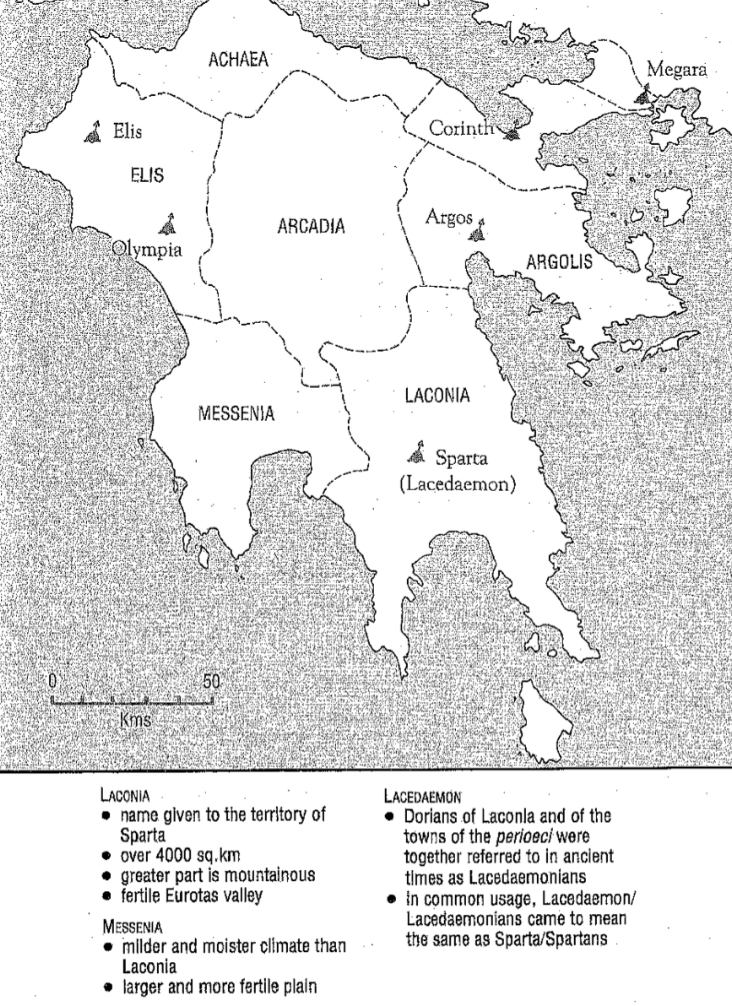
15
New cards
Spartan development during the 8th century BCE
A fifth village joins the city of Sparta, Sparta’s endeavours to control its surrounding region of Laconia in the Peloponnese was slow
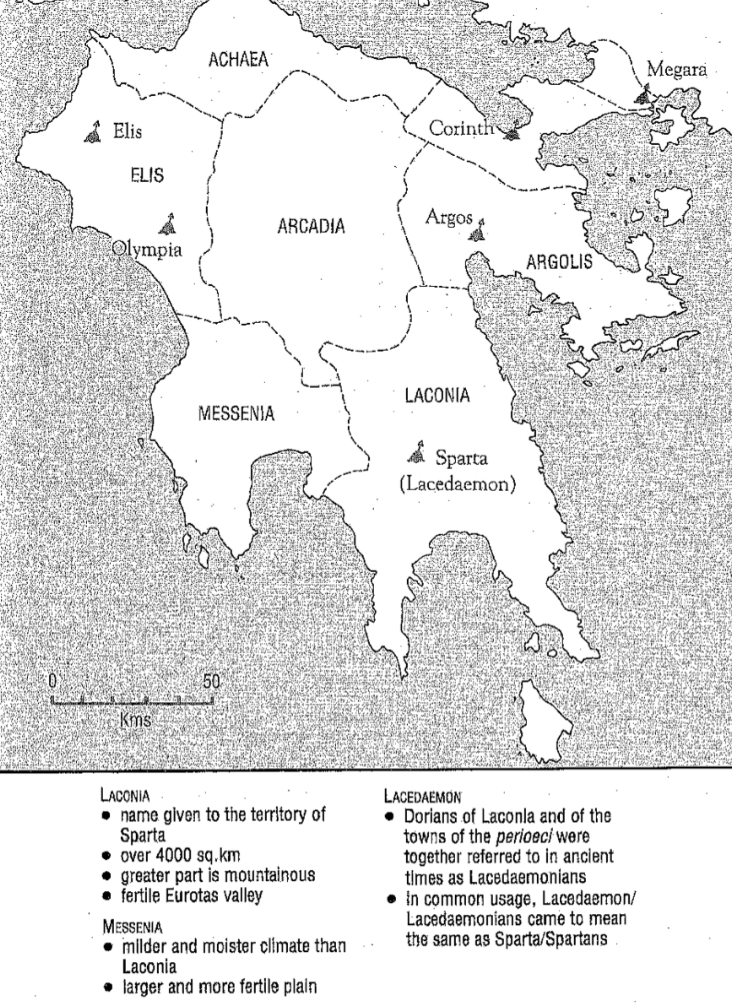
16
New cards
Spartan development during the 750s BCE
Sparta becomes the hegemon of Laconia: (a) Messenians are reduced to helot status after being conquered (b) survivors from pre-Dorian times are also reduced to helot status (c) other Dorian settlements are made ‘perioeci’ politically subordinate to Sparta (d) the ‘gerousia’ was borne out of a constitutional crisis between kings and aristocracy
17
New cards
perioeci
Second-tier citizens politically subordinate to the polis of Sparta
18
New cards
gerousia
Spartan council (of old men?) formed in the 750s BCE
19
New cards
Taras in Southern Italy is founded by Sparta
\~707 BCE
20
New cards
Spartan development in the 7th century BCE
Period of prosperity! Arts and culture flourished (ceramics, sculpture, architecture, music, poetry) + trade with the east
21
New cards
Spartan development in the 650s BCE
The second Messenian war & a second constitutional crisis
22
New cards
The second Messenian war date range
650s BCE
23
New cards
The second Messenian war outcomes
Sparta not only defeat the Messenians, they enslave the population and divide the land into ‘kleroi’ their allotment system for Spartan citizens
24
New cards
“Rise ye sons of heroic Sparta, ye sons of warrior fathers \[…\] Spare not in the least your lifeblood, For this is not like to Spartans”
Tyrtaeus inspirational martial poem from the 17-year second Messenian war
25
New cards
650s BCE second constitutional crisis
this time between noble and common peoples to bring about democratic changes
26
New cards
Spartan development in the 6th cent BCE
A pivot in Spartan values and way of life, foreign imports practically ceased, decay in Laconian art
27
New cards
Cease of foreign imports in 6th cent BCE
Indicative of the Spartan isolationism we see in the 5th cent BCE depth study
28
New cards
“\[Lycurgus\] declared an outlawry of all needless and superfluous arts“
Plutarch on Spartan societal shift in the 6th cent BCE
29
New cards
New Spartan values and way of life introduced in the 6th cent BCE
practising absolute seriousness, devotion to duty, and iron discipline
30
New cards
Spartan development in the 550s BCE
Sparta won military successes against Tegea and Argos, becomes head of the ‘loose confederacy’ of the Peloponnese except Achaea and Argos, Spartan political domination approach shifts from gaining territory to forming alliances, ephors become a democratic institution
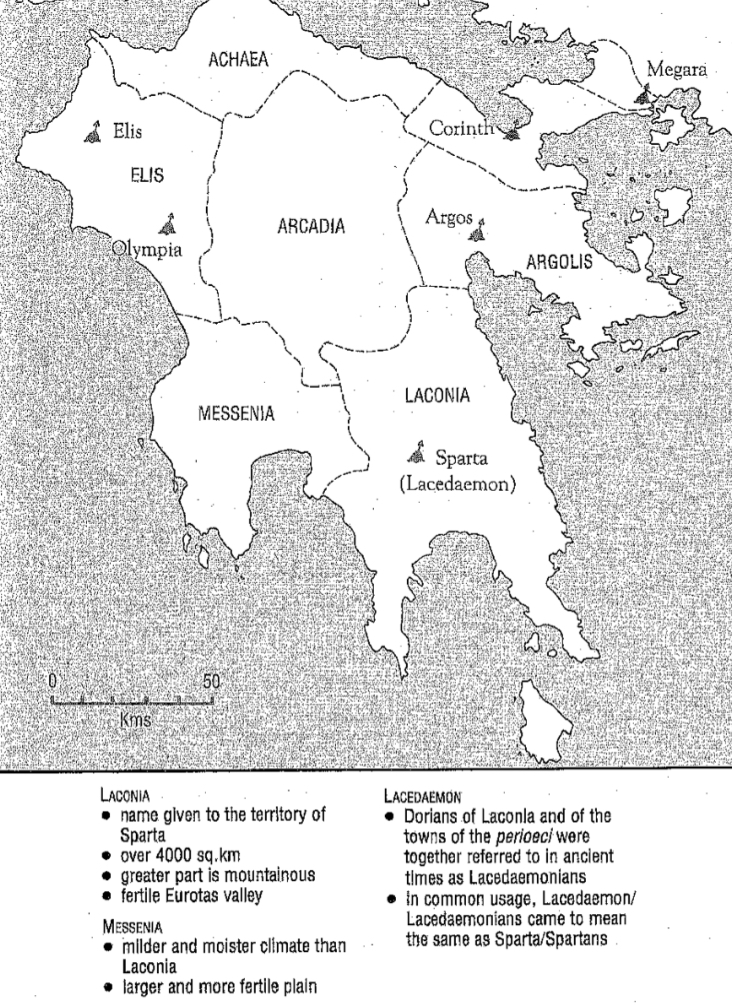
31
New cards
Ephors
Keep the kings in check and fight against tyranny, become a supreme democratic institution in the 550s BCE
32
New cards
Helots
State-owned slaves
33
New cards
Inferiors
Adopted playmates, freed helots, illegitimate Spartans, those who lost citizenship
34
New cards
Spartans
Equals, Spartiates, Spartan women
35
New cards
Structure of Spartan society
Spartans → inferiors → helots
36
New cards
Farming in Spartan society
Forbidden to the Spartan class!! Farming is for helots and perioeci
37
New cards
Political power in Spartan society
Held entirely by the Spartan class (Spartiates, equals, Spartan women)
38
New cards
Spartiates were all equal under law
All subjected to the same training and discipline
39
New cards
Spartiate economic status
There were both rich and poor Spartiates, but the existence of a Spartiate nobility is contested
40
New cards
State support for Spartiates
Given helots and an allotment of land 'kerosene/kleroi’
41
New cards
Spartiate high code of honour
Courage, loyalty, endurance, obedience
42
New cards
Spartiates
Full time soldiers owing total obedience to the state
43
New cards
Spartiate origins
Original Dorian conquerors of Laconia, never numbering more than \~10,000
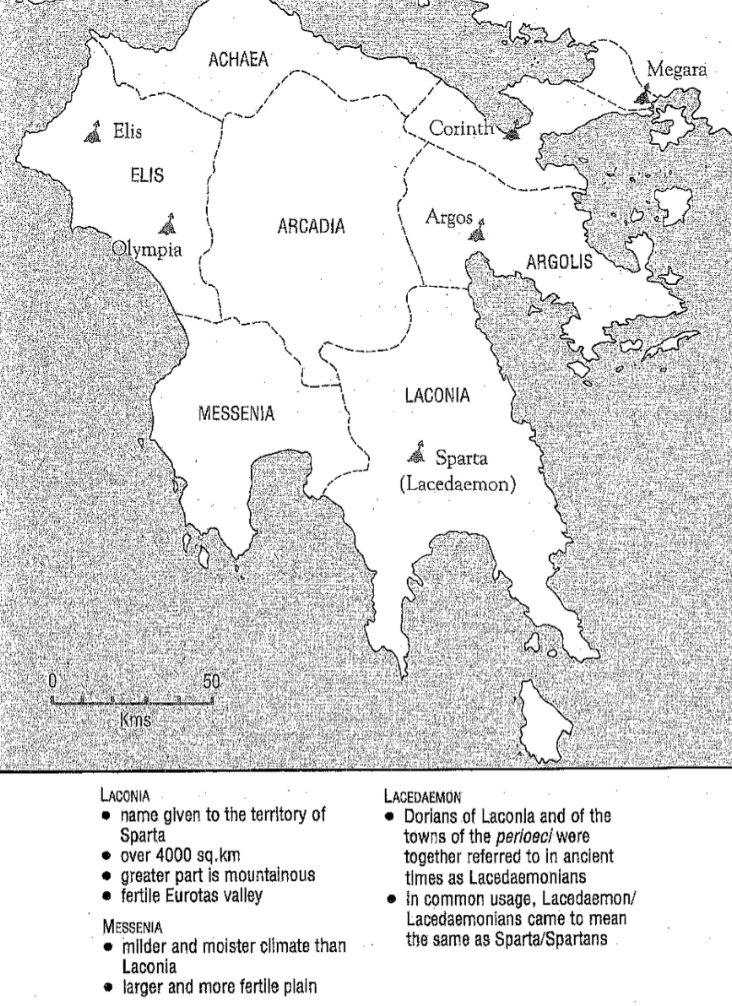
44
New cards
Emancipation of Spartan women
Shared sports with men and mingled freely with them
45
New cards
Spartan women in politics
They weren’t! They were forbidden from holding public office and voting
46
New cards
Spartan women and spinning/weaving
They didn't! This was considered to be a task for slaves
47
New cards
Training of Spartan women
Trained to be fit companions, mothers of warriors and heroes
48
New cards
Spartan women and wealth
Very wealthy! Particularly during the 5th cent BCE when the male population declines and 2/5 of land came into the hands of Spartan women
49
New cards
Spartan women values
Modest and careful of health, whilst growing up in physical freedom
50
New cards
Spartan women restrictions
Forbidden to wear jewellery, cosmetics, and perfume
51
New cards
Perioeci strategically
Their villages served as buffers and walls preventing escaping helots
52
New cards
Perioeci governance in their own communities
Autonomous
53
New cards
Perioeci governance involving Spartiates
Brought to trial before ephors rather than the autonomous government in their own communities
54
New cards
Perioeci citizenship
Owed allegiance to Sparta but had local citizenship
55
New cards
Perioeci marriage inequality (??)
Were forbidden to intermarry with Spartiates
56
New cards
Perioeci origin
Dorian, living in \~100 scattered communities in areas under Spartan control
57
New cards
Perioeci politics
Had no share in the formulation of Spartan policy
58
New cards
Perioeci contribution to Spartan society
Largely economic - heavily engaged in trade and industry, Spartan kings’ revenue coming from their estates in perioeci land
59
New cards
Perioeci adult men
Expected to serve as hoplites alongside Spartiates, despite not being involved in training
60
New cards
Perioeci citizens along the coast
Fishermen, shipbuilders, and the best sailors in the navy
61
New cards
Aspects of Spartan citizenship
Birth, training, and military messes
62
New cards
Spartan citizenship: Birth
Provable descent from original Dorian conquerors
63
New cards
Spartan citizenship: training
Submission to the Spartan military school ‘agoge’ and discipline imposed upon them
64
New cards
Spartan citizenship: military messes
Membership of ‘syssitia’ 'phiditia’ or other Spartan military messes, and continues payment of contributions
65
New cards
Inferiors appearance
Wore specific types of clothes, were unshaven
66
New cards
Inferiors community
Exercised alone, avoided by everybody
67
New cards
Inferiors politics
Couldn’t vote or attend the assembly etc
68
New cards
Loss of Spartan citizenship
A special decree is issued and the Spartan is stripped of citizenship, becomes part of the Inferiors
69
New cards
Inferiors
Neither slaves nor citizens
70
New cards
Inferiors: parthenai
Illegitimate offspring of helot mothers and Spartiate fathers
71
New cards
Inferiors: neodamodes
Helots who were freed by the state for acts of courage or service but still had no civic rights
72
New cards
Inferiors: tresantes
Cowards who were Spartan peers but lost citizenship, not necessarily permanently
73
New cards
Inferiors: mothoces
Sons of helots who were adopted as playmates for Spartan boys and shared their training
74
New cards
Helots
Lowest Spartan social class of state-owned slaves
75
New cards
Helots origin
Pre-Dorian inhabitants who were conquered by Spartans, some part-Dorian
76
New cards
Helot homes
Lived on Spartiates’ land with their families and could not move without permission from the government
77
New cards
Helots main duty
Provide a fixed amount of produce to Spartan masters annually (once the upkeep of Spartans was covered they were free to make a profit off the rest of their produce)
78
New cards
Helots during war
Served Spartan soldiers during war, sometimes acted as light-armed skirmishers in battle
79
New cards
Helots harsh treatment
Always under suspicion of revolt, killed by a secret police force ‘krypteia’ to keep them under control
80
New cards
Helots politically
Had no legal or political rights whatsoever, only the state could free or dispose of them
81
New cards
Helots threat to Spartan security
Were discontented and rebellious, potential to do real damage as outnumbered Spartiates \~20x
82
New cards
Influence of helots on Spartan foreign policy
Supported oligarchies in fear of the power of democracy for helots, hesitated to undertake military operations far from home in case of a helot revolt the army was unable to retaliate to
83
New cards
First 6 years of a Spartan boy’s life
Discipline was imposed by the mother with the help of a nurse
84
New cards
7-12 Spartan boys
Left home to live in barracks with others of the same age and complete their education under the control of a public guardian ‘paidonomos’
85
New cards
paidonomos
Public guardian or supervisor of education for Spartan boys aged 7-12
86
New cards
12-18 Spartan boys
Intensive cadet soldier training: barefoot at all times to run and climb faster, wore one garment in all weather conditions, plucked reeds to make beds by hand, etc
87
New cards
Education of Spartan girls
Vigorous physical training for child-bearing
88
New cards
Aristophanes’ caricature of Spartan women
Lampito in Lysistrata
89
New cards
4th cent BCE disadvantages of Spartan education and values
Spartans were unable to adapt satisfactorily to changing conditions
90
New cards
Festival of the Gymnopaediae
all Spartan males competed, whole battalions of soldiers both old and young sang of their prowess and courage, and of deeds yet to be performed
91
New cards
Flogging of the youths at the altar of Artemis Orthia
Typical endurance contest of Spartan men, tied with initiation and bonding with god through bloodshed, a statue of honour of the boy who endured the longest
92
New cards
Public messes ‘syssitia’ ‘phiditia’
Common meals created to strike a blow at luxury, since rich and poor shared the same email
93
New cards
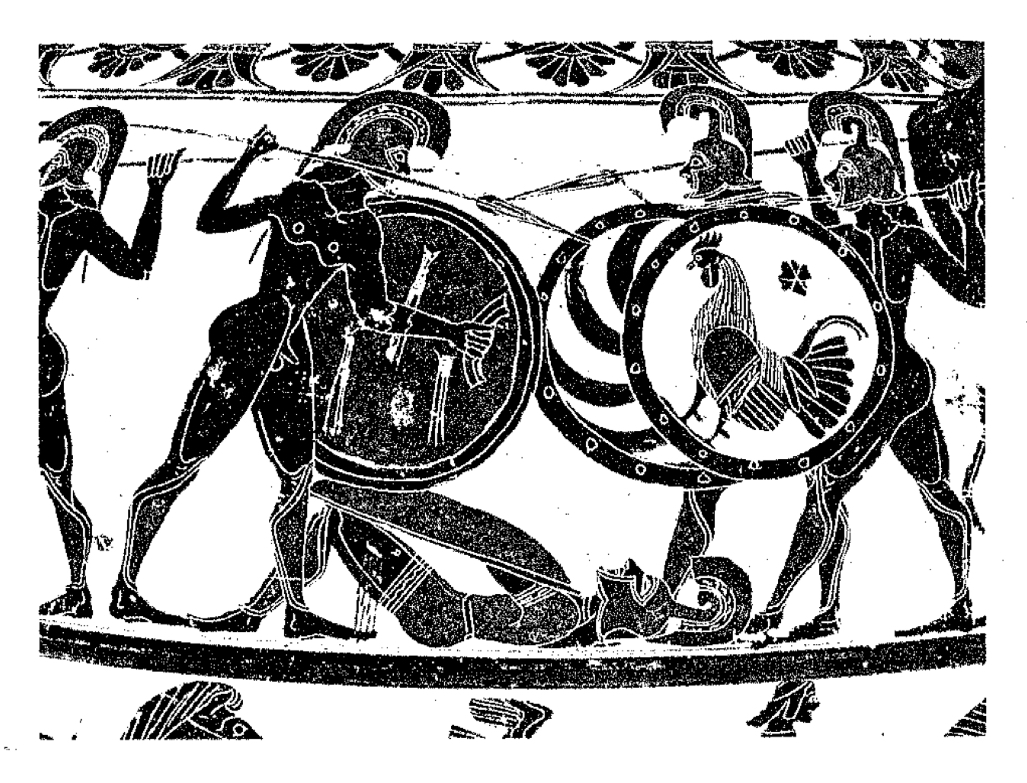
\
Hoplites in battle, from a 6th cent BCE Corinthian krater currently in the Louvre
94
New cards
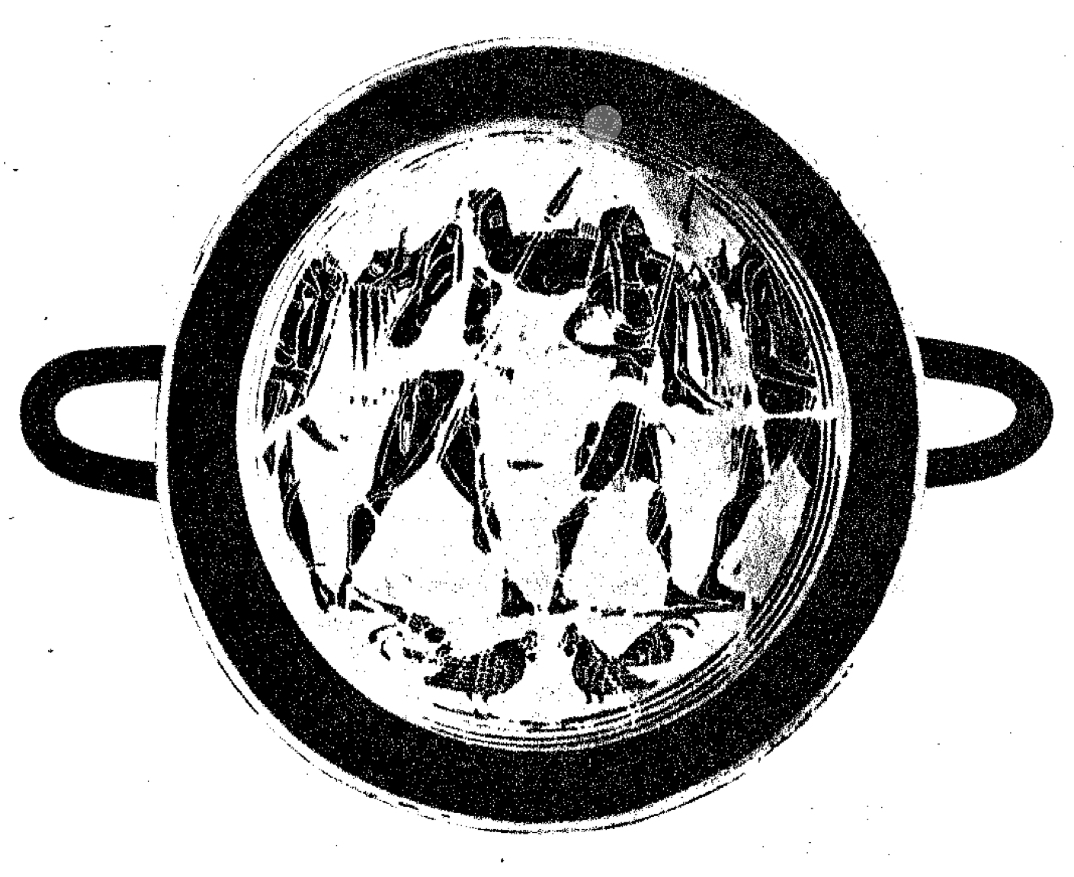
Body of a Spartan warrior being carried from the battlefield by his fellow soldiers, 550-540 BCE kylix by a Laconian artist
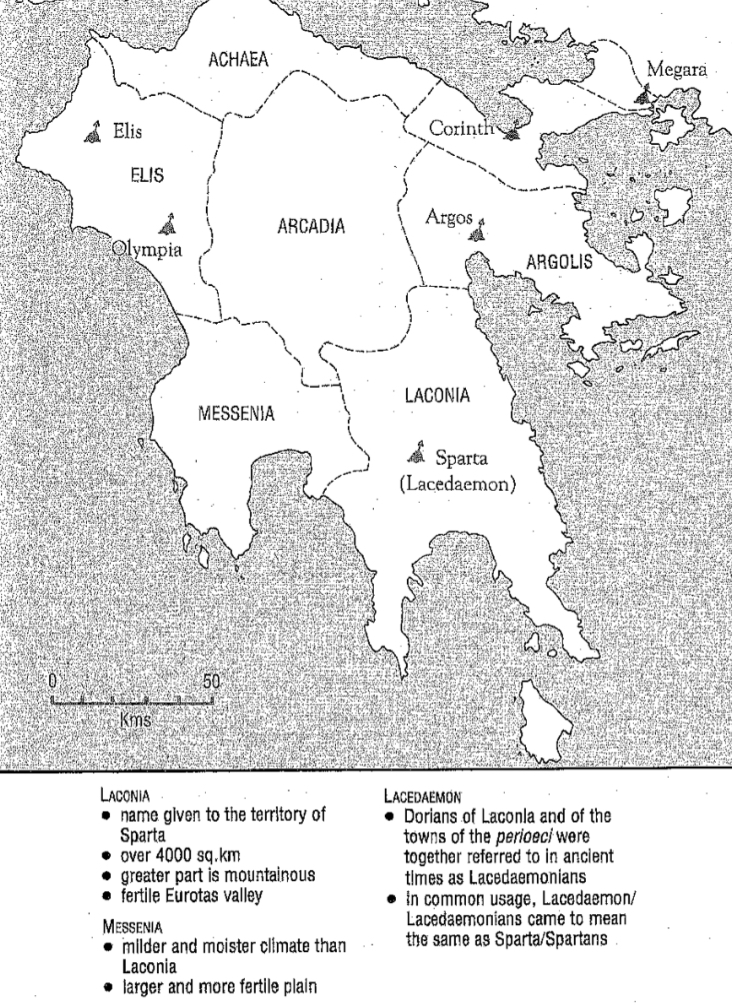
95
New cards
Plato on Sparta’s government system
Couldn’t decide whether democracy or tyranny, felt that Sparta had blended the best and avoided the worst features of each respectively
96
New cards
Aristotle on Sparta’s government system
A happy mixture of democracy and oligarchy
97
New cards
Cicero on Sparta’s government system
“a mixed constitution“
98
New cards
95% of Sparta’s population
Not full citizens
99
New cards
Agiads
Royal clan of Sparta, dual kingship with Eurypontid kings
100
New cards
Eurypontids
Royal clan of southern Laconia then Sparta, dual kingship with Agiad kings